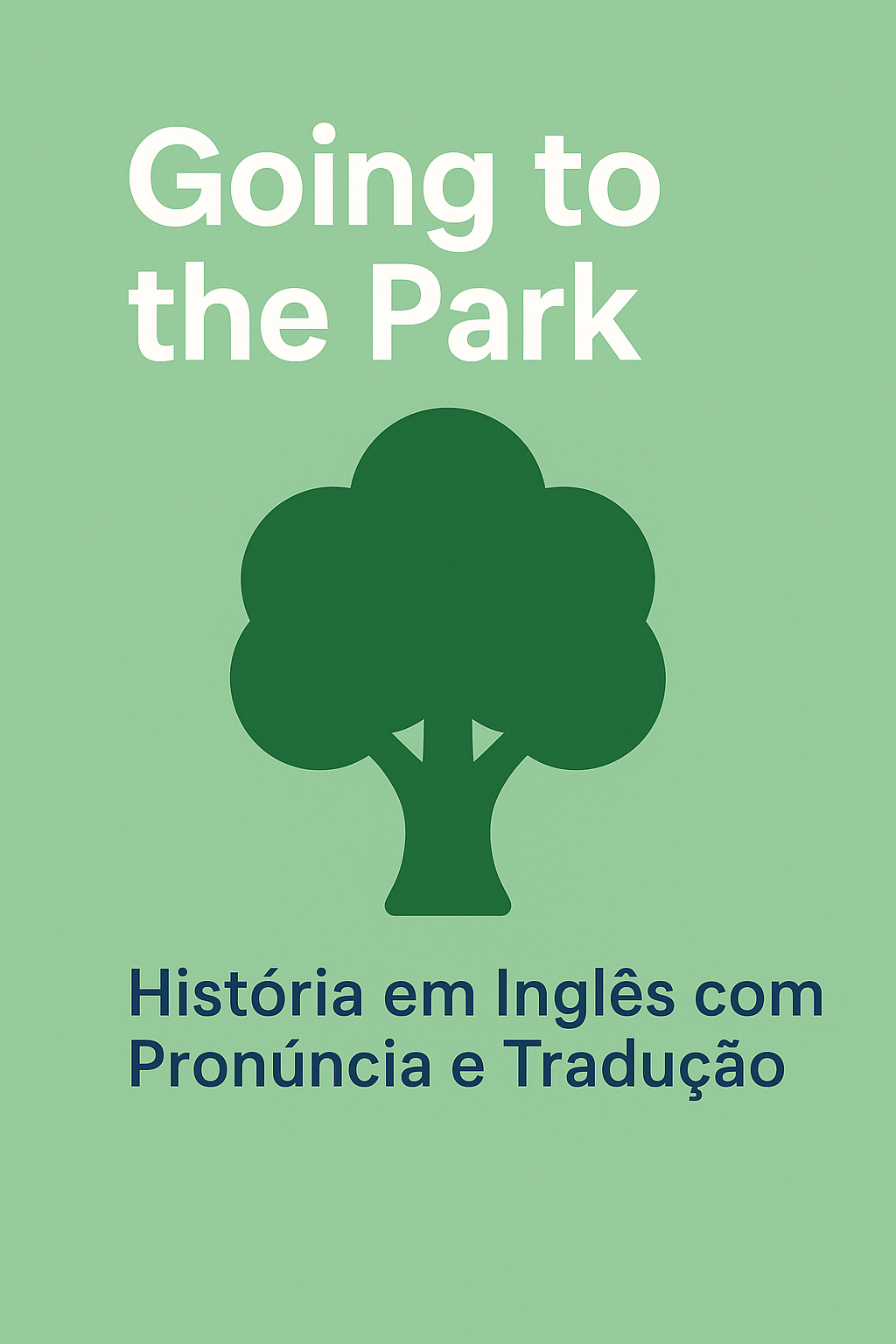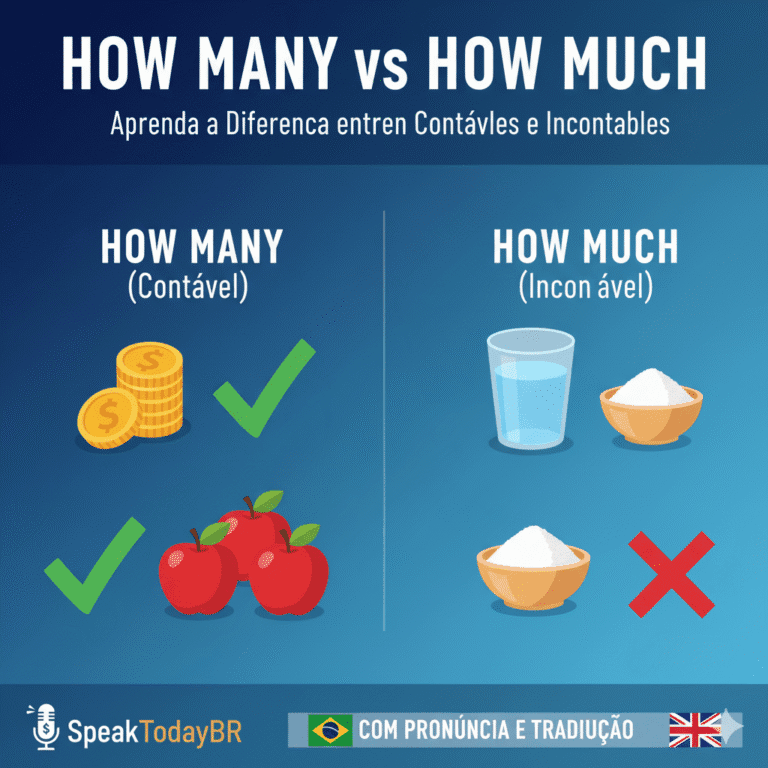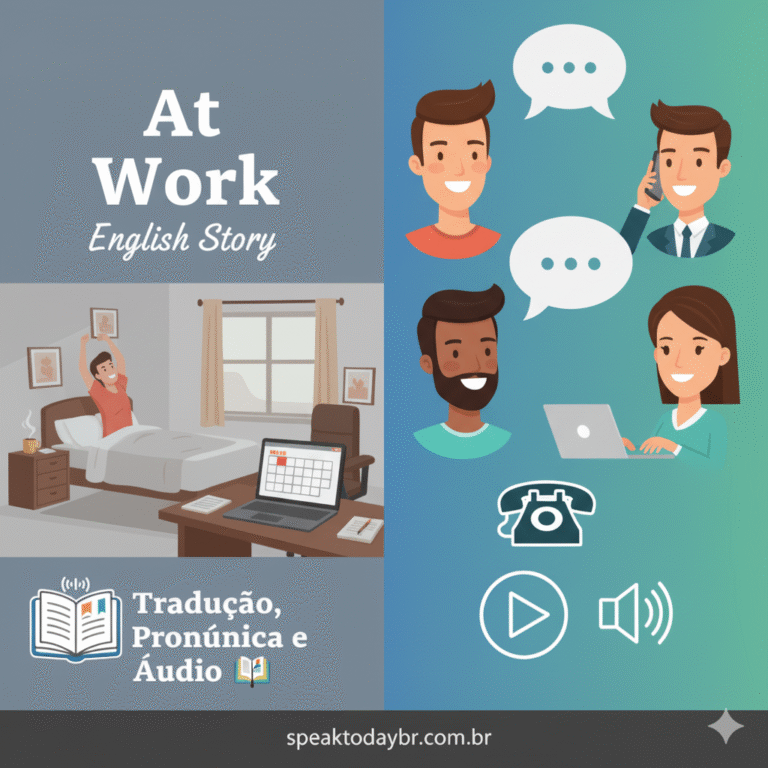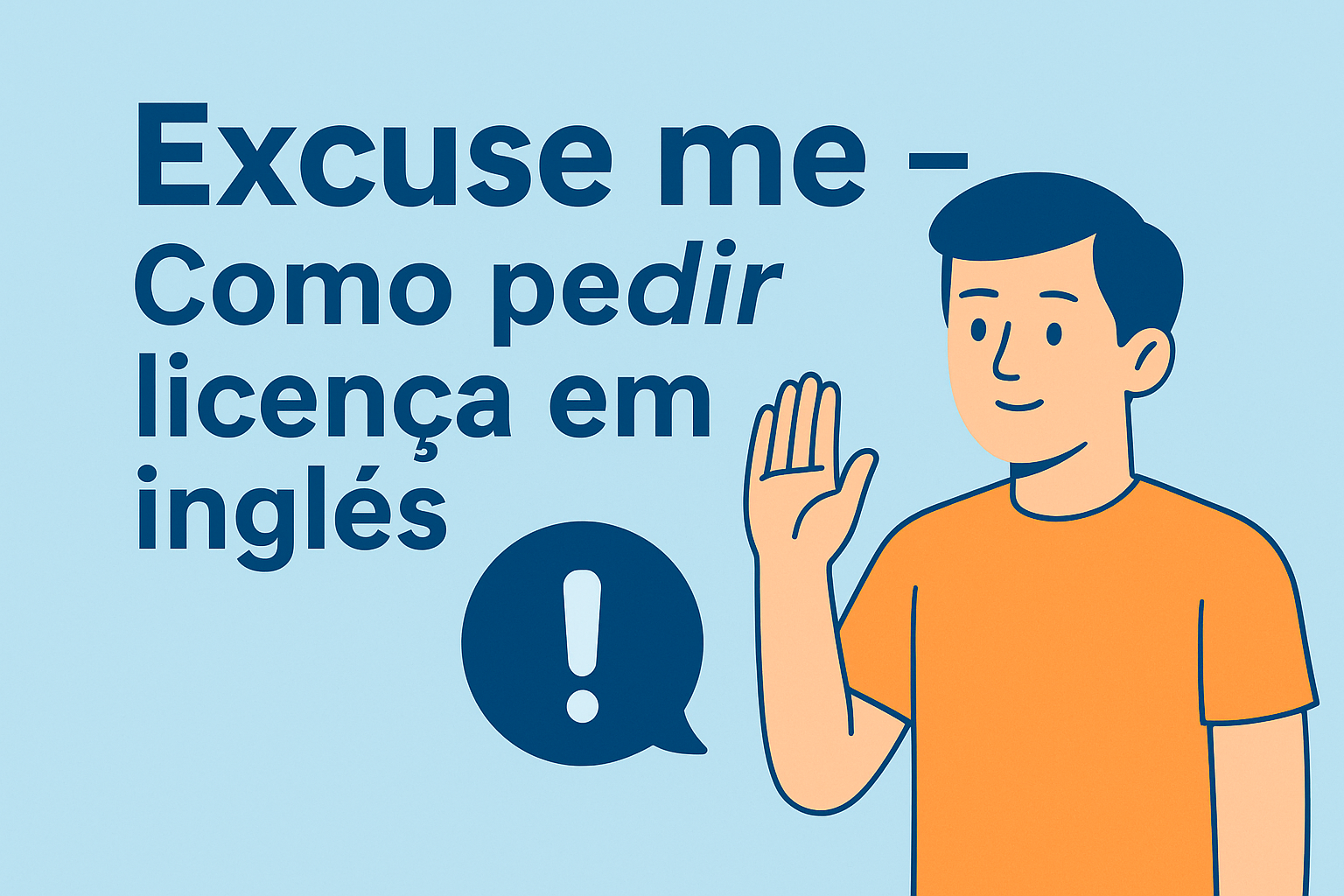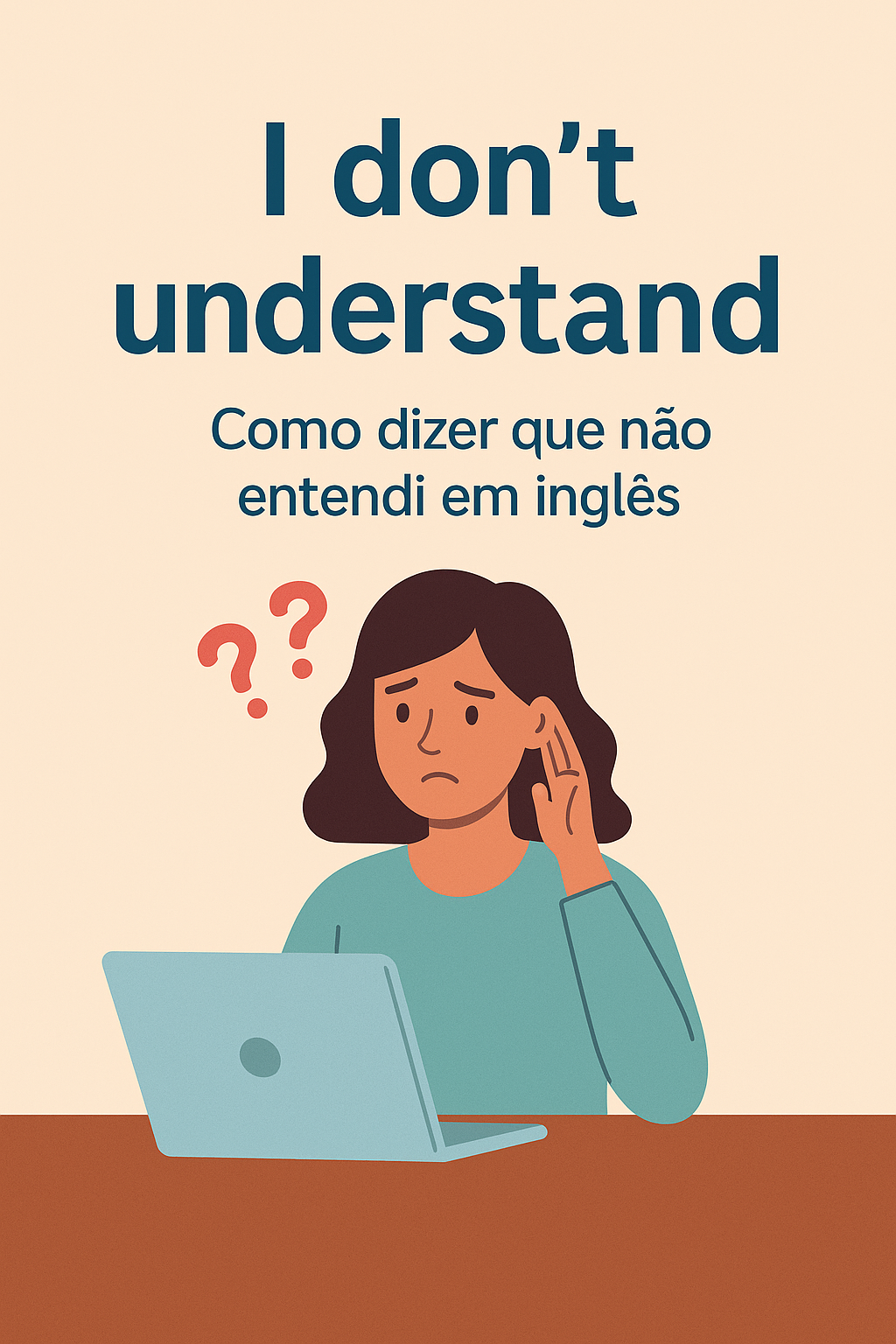Going to the Park – História em Inglês com Pronúncia e Tradução
Going to the Park – História em Inglês com Tradução, Pronúncia e Áudio
Aprenda inglês com a história “Going to the Park”! Aqui você vai praticar vocabulário sobre passeios ao ar livre, natureza e atividades no parque. Texto, tradução, pronúncia e áudio!
🔑 Como praticar esta história em inglês:
- ▶️ Ouça o áudio completo para se familiarizar com o vocabulário sobre parques e lazer.
- 📖 Leia o texto em inglês acompanhando cada frase enquanto escuta.
- 🗣️ Pause e repita em voz alta para melhorar sua pronúncia.
- ✅ Confira a tradução linha por linha para entender o significado de tudo.
- 🔁 Pratique várias vezes até se sentir confiante ao falar sobre o tema.
📄 Texto completo em inglês:
I wake up early on Saturday morning.
The sun is shining, and the weather is nice.
I decide to go to the park.
I put on my sneakers and take my water bottle.
I walk to the park and see many people.
Some people are jogging.
Some people are walking their dogs.
Children are playing and laughing.
I find a bench and sit down for a while.
I watch the birds in the trees.
I listen to music and relax.
After some time, I get up and walk around the park.
I feel the fresh air and enjoy the moment.
I take a few photos with my phone.
Before going home, I buy an ice cream from a small stand.
It’s a perfect morning at the park.
🔊 Áudio da história:
🗣️ Texto com Pronúncia e Tradução:
I wake up early on Saturday morning.
(Ai uêik âp ârli ón sáterdei mórnin)
(Eu acordo cedo no sábado de manhã)
The sun is shining, and the weather is nice.
(Dhâ sãn is sháinin, end dhâ uédhâr is náis)
(O sol está brilhando e o clima está bom)
I decide to go to the park.
(Ai dssáid tu gou tu dhâ párk)
(Eu decido ir ao parque)
I put on my sneakers and take my water bottle.
(Ai pût ón mai sníkârs end teik mai uóter bótol)
(Eu coloco meus tênis e pego minha garrafa de água)
I walk to the park and see many people.
(Ai uók tu dhâ párk end sí méni pípol)
(Eu caminho até o parque e vejo muitas pessoas)
Some people are jogging.
(Sâm pípol ár djóguin)
(Algumas pessoas estão correndo)
Some people are walking their dogs.
(Sâm pípol ár uókin dhêr dógs)
(Algumas pessoas estão passeando com seus cachorros)
Children are playing and laughing.
(Tchíldrên ár plêin end láfin)
(Crianças estão brincando e rindo)
I find a bench and sit down for a while.
(Ai fáind a bêntch end sit dáun fór a uáil)
(Eu encontro um banco e me sento por um tempo)
I watch the birds in the trees.
(Ai uótch dhâ bârds in dhâ tríz)
(Eu observo os pássaros nas árvores)
I listen to music and relax.
(Ai líssen tu miúzik end riláks)
(Eu escuto música e relaxo)
After some time, I get up and walk around the park.
(Áftâr sâm táim, ai guét âp end uók âráund dhâ párk)
(Depois de um tempo, eu me levanto e caminho pelo parque)
I feel the fresh air and enjoy the moment.
(Ai fíil dhâ frésh ér end indjói dhâ môumênt)
(Eu sinto o ar fresco e aproveito o momento)
I take a few photos with my phone.
(Ai teik a fiú fórous uíth mai fôn)
(Eu tiro algumas fotos com meu celular)
Before going home, I buy an ice cream from a small stand.
(Bifór gouin hôum, ai bai én áis crím frâm a smól stênd)
(Antes de ir para casa, eu compro um sorvete de uma barraca pequena)
It’s a perfect morning at the park.
(Its a pérfêct mórnin ét dhâ párk)
(É uma manhã perfeita no parque)
🎓 Aula de Vocabulário: Going to the Park
1. 📝 Palavras e expressões‑chave
- Park – parque
- Playground – parquinho
- Bench – banco (para sentar)
- Dog walker – pessoa passeando um cachorro
- Swing – balanço
- Slide – escorregador
- Picnic – piquenique
- Enjoy – aproveitar
2. 📘 Definições + exemplos extras
Playground – área com brinquedos para crianças
👉 The children love the playground.
(As crianças adoram o parquinho.)
Picnic – refeição ao ar livre no parque
👉 We had a picnic near the lake.
(Fizemos um piquenique perto do lago.)
3. 🔄 Expressões da história explicadas
- “We go to the park every Sunday.” – uso de presente simples para rotina semanal.
- “I sit on a bench and read a book.” – descreve a ação de sentar e ler.
- “Kids play on the swings and slide.” – uso de plural e verbos de ação no presente.
4. 🧩 Phrasal Verbs e Idioms
- Hang out – passar tempo relaxando com companhia.
- Walk around – andar por diferentes partes do parque.
- Look after – cuidar de alguém ou algo (ex: de uma criança).
5. 🧠 Sinônimos e antônimos
- Bench: seat, pew | 🆚 ground
- Slide: chute (BR), gliding board | 🆚 climb
- Enjoy: appreciate, relish | 🆚 dislike
6. ✍️ Mini exercícios interativos
Pergunta 1: “Swing” é:
A) Escorregador B) Brinquedo de balançar C) Banco
✅ Resposta: B) Brinquedo de balançar
Complete:
“We ____ to the park on Sundays.”
✅ Sugestão: go
Use “picnic” numa frase:
(Ex: “They plan a picnic next weekend.”)
Pergunta 2: “Walk around” significa:
A) Correr rápido B) Caminhar por aí C) Gritar
✅ Resposta: B) Caminhar por aí
7. 🗣️ Uso no contexto da história
- Descreve atividades comuns em parques com vocabulário fácil.
- Apresenta phrasal verbs úteis para um passeio descontraído.
- Fortalece compreensão do presente simples em contexto real.
📌 Conclusão da Aula
Agora que você aprendeu essas expressões sobre parque, escreva nos comentários **2 frases** usando “playground” ou “walk around” sobre um passeio que você gostaria de fazer! 😊
📌 Este conteúdo é educativo e segue o uso justo (fair use) para fins de ensino de idiomas. As expressões e exemplos são usados exclusivamente com propósito pedagógico.
